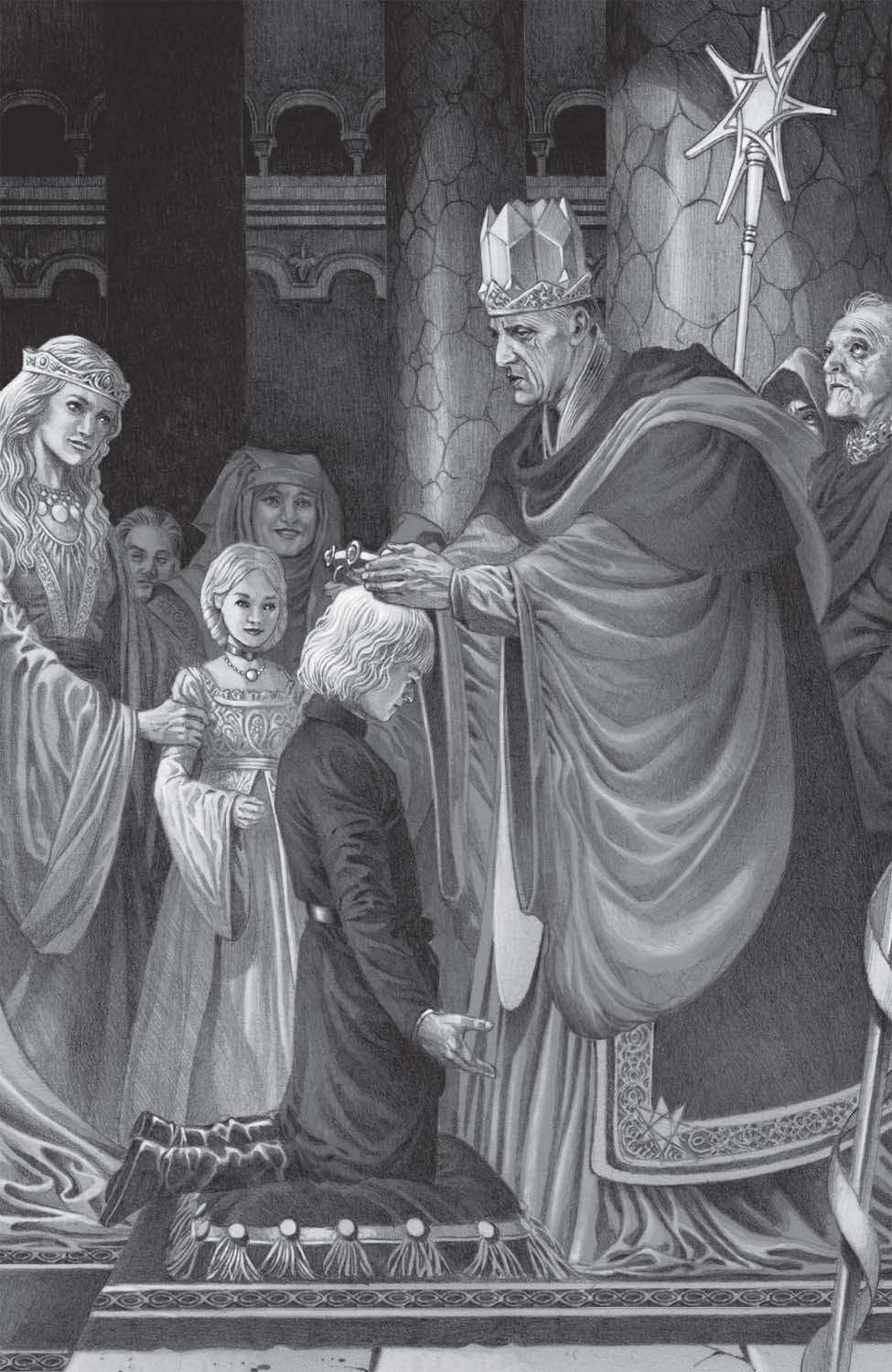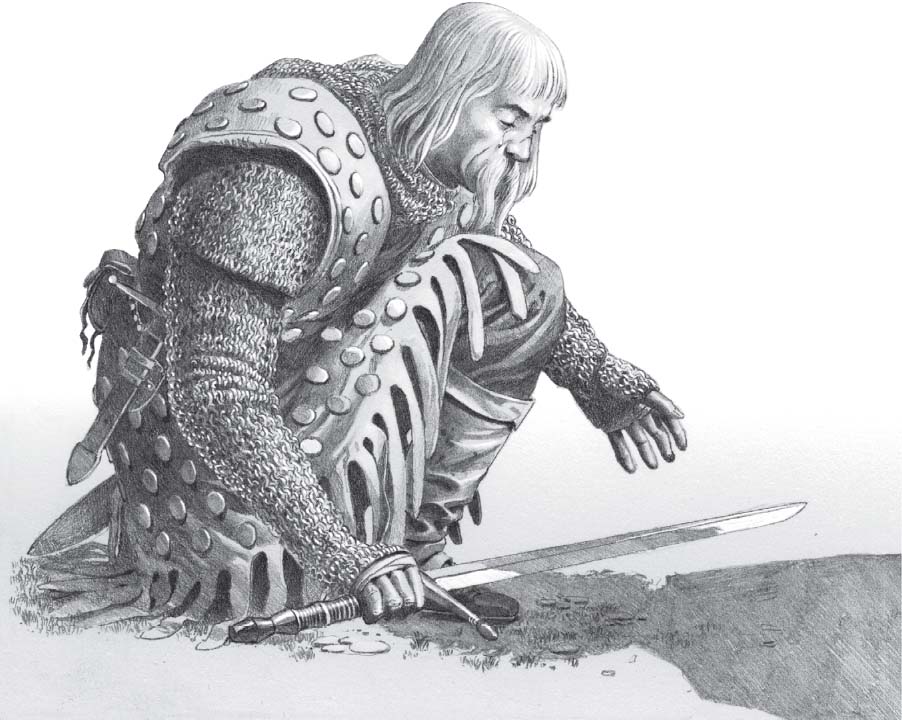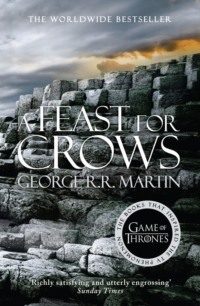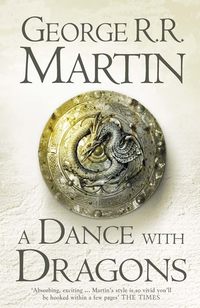
Полная версия
Fire and Blood
The long conflict between King Maegor and the Faith had made it imperative that Jaehaerys be anointed king by the High Septon, Lord Rogar and the Queen Regent agreed. Before that could happen, however, Septon Moon and his ragged horde must needs be dealt with, so the prince could travel safely to Oldtown. It had been hoped that the news of Maegor’s death would be sufficient to persuade Moon’s followers to disperse, and some had done just that … but no more than a few hundred in a host that numbered close to five thousand. “What can the death of one dragon matter when another rises up to take its place?” Septon Moon declared to his throng. “Westeros will not be clean again until all the Targaryens have been slain or driven back into the sea.” Every day he preached anew, calling upon Lord Hightower to deliver Oldtown to him, calling upon the High Lickspittle to leave the Starry Sept and face the wroth of the Poor Fellows he had betrayed, calling upon the smallfolk of the realm to rise up. (And every night he sinned anew.)
Across the realm in King’s Landing, Jaehaerys and his counselors considered how to rid the realm of this scourge. The boy king and his sisters, Rhaena and Alysanne, all had dragons, and some felt the best way to deal with Septon Moon was the way Aegon the Conqueror and his sisters had dealt with the Two Kings on the Field of Fire. Jaehaerys had no taste for such slaughter, however, and his mother, Queen Alyssa, flatly forbade it, reminding them of the fate of Rhaenys Targaryen and her dragon in Dorne. Lord Rogar, the King’s Hand, said, with some reluctance, that he would lead his own host across the Reach and disperse Moon’s men by force of arms … though it would mean pitting his stormlanders, and whatever other forces he might gather, against Lords Rowan and Oakheart and their knights and men-at-arms, as well as the Poor Fellows. “Like as not, we will win,” the Protector said, “but not without cost.”
Mayhaps the gods were listening, for even as the king and council argued in King’s Landing the problem was resolved in a most unexpected way. Dusk was falling outside of Oldtown when Septon Moon retired to his tent for his evening meal, exhausted by a day of preaching. As always he was guarded by his Poor Fellows, huge strapping axemen with unshorn beards, but when a comely young woman presented herself at the septon’s tent with a flagon of wine that she wished to give to His Holiness in return for his help, they admitted her at once. They knew what sort of help the woman required; the sort that would put a babe inside her belly.
A short time passed, during which the men outside the tent heard only occasional gusts of laughter from Septon Moon, inside. But then, suddenly, there was a groan, and a woman’s shriek, followed by a bellow of rage. The tent flap was thrown open and the woman burst out, half-naked and barefoot, and dashed away wide-eyed and terrified before any of the Poor Fellows could think to stop her. Septon Moon himself followed a moment later, naked, roaring, and drenched in blood. He was holding his neck, and blood was leaking between his fingers and dripping down into his beard from where his throat had been slit open.
It is said that Moon staggered through half the camp, lurching from campfire to campfire in pursuit of the doxy who had cut him. Finally even his great strength failed him; he collapsed and died as his acolytes pressed around him, wailing their grief. Of his slayer there was no sign; she had vanished into the night, never to be seen again. Angry Poor Fellows tore the camp apart for a day and a night in search of her, knocking over tents, seizing dozens of women, and beating any man who tried to stand in their way … but the hunt came up empty. Septon Moon’s own guards could not even agree on what his killer had looked like.
The guards did recall that the woman had brought a flagon of wine with her as a gift for the septon. Half the wine still remained in the flagon when the tent was searched, and four of the Poor Fellows shared it as the sun was coming up, after carrying the corpse of their prophet back to his own bed. All four were dead before noon. The wine had been laced with poison.
In the aftermath of Moon’s death, the ragged host that he had led to Oldtown began to disintegrate. Some of his followers had already slipped away when word of King Maegor’s death and Prince Jaehaerys’s ascension reached them. Now that trickle became a flood. Before the septon’s corpse had even begun to stink, a dozen rivals had come forward to claim his mantle, and fights began to break out amongst their respective followers. It might have been thought that Moon’s men would turn to the two lords amongst them for leadership, but nothing could be further from the truth. The Poor Fellows especially were no respectors of nobility … and the reluctance of Lords Rowan and Oakheart to commit their knights and men-at-arms to an assault on the walls of Oldtown had made them suspicious of the two lords.
The possession of Moon’s mortal remains became itself a bone of contention between two of his would-be successors, the Poor Fellow known as Rob the Starvling and a certain Lorcas, called Lorcas the Learned, who boasted of having committed all of The Seven-Pointed Star to memory. Lorcas claimed to have had a vision that Moon would yet deliver Oldtown into the hands of his followers, even after death. After seizing the septon’s body from Rob the Starvling, this “learned” fool strapped it atop a destrier, naked, bloody, and rotting, to storm the gates of Oldtown.
Fewer than a hundred men joined in the attack, however, and most of them died beneath a rain of arrows, spears, and stones before they got within a hundred yards of the city walls. Those who did reach the walls were drenched in boiling oil or set afire with burning pitch, Lorcas the Learned himself amongst them. When all his men were dead or dying, a dozen of Lord Hightower’s boldest knights rode forth from a sally port, seized Septon Moon’s body, and removed his head. Tanned and stuffed, it would later be presented to the High Septon in the Starry Sept as a gift.
The abortive attack proved to be the last gasp of Septon Moon’s crusade. Lord Rowan decamped within the hour, with all his knights and men-at-arms. Lord Oakheart followed the next day. The remainder of the host, hedge knights and Poor Fellows and camp followers and tradesmen, streamed away in all directions (looting and pillaging every farm, village, and holdfast in their path as they went). Fewer than four hundred remained of the five thousand that Septon Moon had brought to Oldtown when Lord Donnel the Delayer at last bestirred himself and rode forth in force to slaughter the stragglers.
Moon’s murder removed the last major obstacle to the accession of Jaehaerys Targaryen to the Iron Throne, but from that day to this, debate has raged as to who was responsible for his death. No one truly believed that the woman who attempted to poison the “sinful septon” and ended by cutting his throat was acting on her own. Plainly she was but a catspaw … but whose? Did the boy king himself send her forth, or was she mayhaps an agent of his Hand, Rogar Baratheon, or his mother, the Queen Regent? Some came to believe that the woman was one of the Faceless Men, the infamous guild of sorcerer-assassins from Braavos. In support of this claim, they cited her sudden disappearance, the way she seemed to “melt into the night” after the murder, and the fact that Septon Moon’s guards could not agree on what she looked like.
Wiser men and those more familiar with the ways of the Faceless Men give this theory little credence. The very clumsiness of Moon’s murder speaks against it being their work, for the Faceless Men take great care to make their killings appear as natural deaths. It is a point of pride with them, the very cornerstone of their art. Slitting a man’s throat and leaving him to stagger forth into the night screaming of murder is beneath them. Most scholars today believe that the killer was no more than a camp follower, acting at the behest of either Lord Rowan or Lord Oakheart, or mayhaps the both of them. Though neither dared desert Moon whilst he lived, the alacrity with which the two lords abandoned his cause after his death suggests that their grievance had been with Maegor, not with House Targaryen … and, indeed, both men would soon return to Oldtown, penitent and obedient, to bend the knee before Prince Jaehaerys at his coronation.
With the way to Oldtown clear and safe once more, that coronation took place in the Starry Sept in the waning days of the 48th year After the Conquest. The High Septon—the High Lickspittle that Septon Moon had hoped to displace—anointed the young king himself, and placed his father Aenys’s crown upon his head. Seven days of feasting followed, during which hundreds of lords great and small came to bend their knees and swear their swords to Jaehaerys. Amongst those in attendance were his sisters, Rhaena and Alysanne; his young nieces, Aerea and Rhaella; his mother, the Queen Regent Alyssa; the King’s Hand, Rogar Baratheon; Ser Gyles Morrigen, the Lord Commander of the Kingsguard; Grand Maester Benifer; the assembled archmaesters of the Citadel … and one man no one could have expected to see: Ser Joffrey Doggett, the Red Dog of the Hills, self-proclaimed Grand Captain of the outlawed Warrior’s Sons. Doggett had arrived in the company of Lord and Lady Tully of Riverrun … not in chains, as most might have expected, but with a safe conduct bearing the king’s own seal.
Grand Maester Benifer wrote afterward that the meeting between the boy king and the outlaw knight “set the table” for all of Jaehaerys’s reign to follow. When Ser Joffrey and Lady Lucinda urged him to undo his uncle Maegor’s decrees and reinstate the Swords and Stars, Jaehaerys refused firmly. “The Faith has no need of swords,” he declared. “They have my protection. The protection of the Iron Throne.” He did, however, rescind the bounties that Maegor had promised for the heads of Warrior’s Sons and Poor Fellows. “I shall not wage war against my own people,” he said, “but neither shall I tolerate treason and rebellion.”

“I rose against your uncle just as you did,” replied the Red Dog of the Hills, defiant.
“You did,” Jaehaerys allowed, “and you fought bravely, no man can deny. The Warrior’s Sons are no more and your vows to them are at an end, but your service need not be. I have a place for you.” And with these words, the young king shocked the court by offering Ser Joffrey a place by his side as a knight of the Kingsguard. A hush fell then, Grand Maester Benifer tells us, and when the Red Dog drew his longsword there were some who feared he might be about to attack the king with it … but instead the knight went to one knee, bowed his head, and laid his blade at Jaehaerys’s feet. It is said that there were tears upon his cheeks.
Nine days after the coronation, the young king departed Oldtown for King’s Landing. Most of his court traveled with him in what became a grand pageant across the Reach … but his sister Rhaena stayed with them only as far as Highgarden, where she mounted her dragon, Dreamfyre, to return to Fair Isle and Lord Farman’s castle above the sea, taking her leave not only of the king, but of her daughters. Rhaella, a novice sworn to the Faith, had remained at the Starry Sept, whilst her twin, Aerea, continued on with the king to the Red Keep, where she was to serve as a cupbearer and companion to the Princess Alysanne.
Yet a curious thing befell Queen Rhaena’s girls after the king’s coronation, it was observed. The twins had ever been mirror images of each other in appearance, but not in temperament. Whereas Rhaella was said to be a bold and willful child and a terror to the septas who had been given charge of her, Aerea had been known as a shy, timid creature, much given to tears and fears. “She is frightened of horses, dogs, boys with loud voices, men with beards, and dancing, and she is terrified of dragons,” Grand Maester Benifer wrote when Aerea first came to court.
That was before Maegor’s fall and Jaehaerys’s coronation, however. Afterward, the girl who remained at Oldtown devoted herself to prayer and study, and never again required chastisement, whereas the girl who returned to King’s Landing proved to be lively, quick-witted, and adventurous, and was soon spending half her days in the kennels, the stables, and the dragon yards. Though nothing was ever proved, it was widely believed that someone—Queen Rhaena herself, mayhaps, or her mother, Queen Alyssa—had used the occasion of the king’s coronation to switch the twins. If so, no one was inclined to question the deception, for until such time as Jaehaerys sired an heir of the body, Princess Aerea (or the girl who now bore that name) was the heir to the Iron Throne.
All reports agree that the king’s return from Oldtown to King’s Landing was a triumph. Ser Joffrey rode by his side, and all along the route they were hailed by cheering throngs. Here and there Poor Fellows appeared, gaunt unwashed fellows with long beards and great axes, to beg for the same clemency that had been granted the Red Dog. This Jaehaerys granted them, on the condition that they agreed to journey north and join the Night’s Watch at the Wall. Hundreds swore to do so, amongst them no less a personage than Rob the Starvling. “Within a moon’s turn of being crowned,” Grand Maester Benifer wrote, “King Jaehaerys had reconciled the Iron Throne to the Faith and put an end to the bloodshed that had troubled the reigns of his uncle and father.”

The Year of the Three Brides
49 AC

The 49th year after Aegon’s Conquest gave the people of Westeros a welcome respite from the chaos and conflict that had gone before. It would be a year of peace, plenty, and marriage, remembered in the annals of the Seven Kingdoms as the Year of the Three Brides.
The new year was but a fortnight old when news of the first of the three weddings came out of the west, from Fair Isle by the Sunset Sea. There, in a small swift ceremony under the sky, Rhaena Targaryen wed Androw Farman, the second son of the Lord of Fair Isle. It was the groom’s first marriage, the bride’s third. Though twice widowed, Rhaena was but twenty-six. Her new husband, just ten-and-seven, was notably younger, a comely and amiable youth said to be utterly besotted with his new wife.
Their wedding was presided over by the groom’s father, Marq Farman, Lord of Fair Isle, and conducted by his own septon. Lyman Lannister, Lord of Casterly Rock, and his wife, Jocasta, were the only great lords in attendance. Two of Rhaena’s former favorites, Samantha Stokeworth and Alayne Royce, made their way to Fair Isle in some haste to stand with the widowed queen, together with the groom’s high-spirited sister, the Lady Elissa. The remainder of the guests were bannermen and household knights sworn to either House Farman or House Lannister. King and court remained entirely ignorant of the marriage until a raven from the Rock brought word, days after the wedding feast and the bedding that sealed the match.
Chroniclers in King’s Landing report that Queen Alyssa was deeply offended by her exclusion from her daughter’s wedding, and that relations between mother and child were never as warm afterward, whereas Lord Rogar Baratheon was furious that Rhaena had dared remarry without the Crown’s leave … the Crown in this instance being himself, as the young king’s Hand. Had leave been asked, however, there was no certainty it would have been granted, for Androw Farman, the second son of a minor lord, was thought by many to be far from worthy of the hand of a woman who had been twice a queen and remained the mother of the king’s heir. (As it happened, the youngest of Lord Rogar’s brothers remained unwed as of 49 AC, and his lordship had two nephews by another brother who were also of a suitable age and lineage to be considered potential mates for a Targaryen widow, facts which might well explain both the Hand’s anger and the secrecy with which Queen Rhaena wed.) King Jaehaerys himself and his sister Alysanne rejoiced at the tidings, dispatching gifts and congratulations to Fair Isle and commanding that the Red Keep’s bells be rung in celebration.
Whilst Rhaena Targaryen was celebrating her marriage on Fair Isle, back in King’s Landing King Jaehaerys and his mother, the Queen Regent, were busy selecting the councillors who would help them rule the realm for the next two years. Conciliation remained their guiding principle, for the divisions that had so recently torn Westeros apart were far from healed. Rewarding his own loyalists and excluding Maegor’s men and the Faithful from power would only exacerbate the wounds and give rise to new grievances, the young king reasoned. His mother agreed.
Accordingly, Jaehaerys reached out to the Lord of Claw Isle, Edwell Celtigar, who had been Hand of the King under Maegor, and recalled him to King’s Landing to serve as lord treasurer and master of coin. For lord admiral and master of ships, the young king turned to his uncle Daemon Velaryon, Lord of the Tides, Queen Alyssa’s brother and one of the first great lords to abandon Maegor the Cruel. Prentys Tully, Lord of Riverrun, was summoned to court to serve as master of laws; with him came his redoubtable wife, the Lady Lucinda, far famed for her piety. Command of the City Watch, the largest armed force in King’s Landing, the king entrusted to Qarl Corbray, Lord of Heart’s Home, who had fought beside Aegon the Uncrowned beneath the Gods Eye. Above them all stood Rogar Baratheon, Lord of Storm’s End and Hand of the King.
It would be a mistake to underestimate the influence of Jaehaerys Targaryen himself during the years of his regency, for despite his youth the boy king had a seat at most every council (but not all, as will be told shortly) and was never shy about letting his voice be heard. In the end, however, the final authority throughout this period rested with his mother, the Queen Regent, and the Hand, a redoubtable man in his own right.
Blue-eyed and black-bearded and muscled like a bull, Lord Rogar was the eldest of five brothers, all grandsons of Orys One-Hand, the first Baratheon Lord of Storm’s End. Orys had been a bastard brother to Aegon the Conqueror and his most trusted commander. After slaying Argilac the Arrogant, last of the Durrandon, he had taken Argilac’s daughter to wife. Lord Rogar could thus claim that both the blood of the dragon and that of the storm kings of old flowed in his veins. No swordsman, his lordship preferred to wield a double-bladed axe in battle … an axe, he oft said, “large and heavy enough to cleave through a dragon’s skull.”
Those were dangerous words during the reign of Maegor the Cruel, but if Rogar Baratheon feared Maegor’s wroth, he hid it well. Men who knew him were unsurprised when he gave shelter to Queen Alyssa and her children after their flight from King’s Landing, and when he was the first to proclaim Prince Jaehaerys king. His own brother Borys was heard to say that Rogar dreamed of facing King Maegor in single combat and cutting him down with his axe.
That dream fate denied him. Instead of a kingslayer, Lord Rogar became a kingmaker, delivering to Prince Jaehaerys the Iron Throne. Few questioned his right to take his place at the side of the young king as Hand; some went so far as to whisper that it would be Rogar Baratheon who ruled the realm henceforth, for Jaehaerys was a boy and the son of a weak father, whilst his mother was only a woman. And when it was announced that Lord Rogar and Queen Alyssa were to marry, the whispers grew louder … for what is a queen’s lord husband, if not a king?
Lord Rogar had been married once before, but his wife had died young, taken off by a fever less than a year after their wedding. The Queen Regent Alyssa was forty-two years old, and thought to be past her child-bearing years; the Lord of Storm’s End, ten years her junior. Writing some years later, Septon Barth tells us that Jaehaerys was opposed to the marriage; the young king felt that his Hand was overreaching himself, motivated more by a desire for power and position than a true affection for his mother. He was angry that neither his mother nor her suitor had sought his leave as well, Barth said … but as he had raised no objections to his sister’s marriage, the king did not believe he had the right to prevent his mother’s. Jaehaerys thus held his tongue and gave no hint of his misgivings save to a few close confidants.
The Hand was admired for his courage, respected for his strength, feared for his military prowess and skill at arms. The Queen Regent was loved. So beautiful, so brave, so tragic, women said of her. Even such lords as might have balked at a woman ruling over them were willing to accept her as their liege, secure in the knowledge that she had Rogar Baratheon standing beside her, and the young king less than a year away from his sixteenth nameday.
She had been a beautiful child, all men agreed, the daughter of the mighty Aethan Velaryon, Lord of the Tides, and his lady wife Alarra of House Massey. Her line was ancient, proud, and rich, her mother esteemed as a great beauty, her grandsire amongst the oldest and closest friends of Aegon the Dragon and his queens. The gods blessed Alyssa herself with the deep purple eyes and shining silvery hair of Old Valyria, and gave her charm and wit and kindness as well, and as she grew suitors flocked around her from every corner of the realm. There was never any true question of whom she would wed, however. For a girl such as her, only royalty would suffice, and in the year 22 AC she married Prince Aenys Targaryen, the unquestioned heir to the Iron Throne.
Theirs was a happy and fruitful marriage. Prince Aenys was a gentle and attentive husband, warm-natured, generous, and never unfaithful. Alyssa bore him five strong, healthy children, two daughters and three sons (a sixth child, another daughter, died in her cradle shortly after birth), and when his sire died in 37 AC, the crown passed to Aenys, and Alyssa became his queen.
In the years that followed, she saw her husband’s reign crumble and turn to ash, as enemies rose up all around him. In 42 AC he died, a broken man and despised, only five-and-thirty years of age. The queen scarce had time to grieve for him before his brother seized the throne that rightly belonged to her eldest son. She saw her son rise up against his uncle and die, together with his dragon. A short while later, her second son followed him to the funeral pyre, tortured to death by Tyanna of the Tower. Together with her two youngest children, Alyssa was made a prisoner in all but name of the man who had brought about the death of her sons, and was made to bear witness when her eldest daughter was forced into marriage to that same monster.
The game of thrones takes many a queer turn, however, and Maegor himself had fallen in turn, in no small part thanks to the courage of the widowed Queen Alyssa, and the boldness of Lord Rogar, who had befriended her and taken her in when no one else would. The gods had been good to them and granted them victory, and now the woman who had been Alyssa of House Velaryon was to be given a second chance at happiness with a new husband.
The wedding of the King’s Hand and the Queen Regent was to be as splendid as that of the widowed Queen Rhaena had been modest. The High Septon himself would perform the marriage rites, on the seventh day of the seventh moon of the new year. The site would be the half-completed Dragonpit, still open to the sky, whose rising tiers of stone benches would allow for tens of thousands to observe the nuptials. The celebrations would include a great tourney, seven days of feasts and frolics, and even a mock sea battle to be fought in the waters of Blackwater Bay.
No wedding half so magnificent had been celebrated in Westeros in living memory, and lords great and small from throughout the Seven Kingdoms and beyond gathered to be part of it. Donnel Hightower came up from Oldtown with a hundred knights and seventy-seven of the Most Devout, escorting His High Holiness the High Septon, whilst Lyman Lannister brought three hundred knights from Casterly Rock. Brandon Stark, the ailing Lord of Winterfell, made the long journey down from the North with his sons Walton and Alaric, attended by a dozen fierce northern bannermen and thirty Sworn Brothers of the Night’s Watch. Lords Arryn, Corbray, and Royce represented the Vale, Lords Selmy, Dondarrion, and Tarly the Dornish Marches. Even from beyond the borders of the realm the great and mighty came; the Prince of Dorne sent his sister, the Sealord of Braavos a son. The Archon of Tyrosh crossed the narrow sea himself with his maiden daughter, as did no fewer than twenty-two magisters from the Free City of Pentos. All brought handsome gifts to bestow on the Hand and Queen Regent; the most lavish came from those who had only lately been Maegor’s men, and from Rickard Rowan and Torgen Oakheart, who had marched with Septon Moon.








